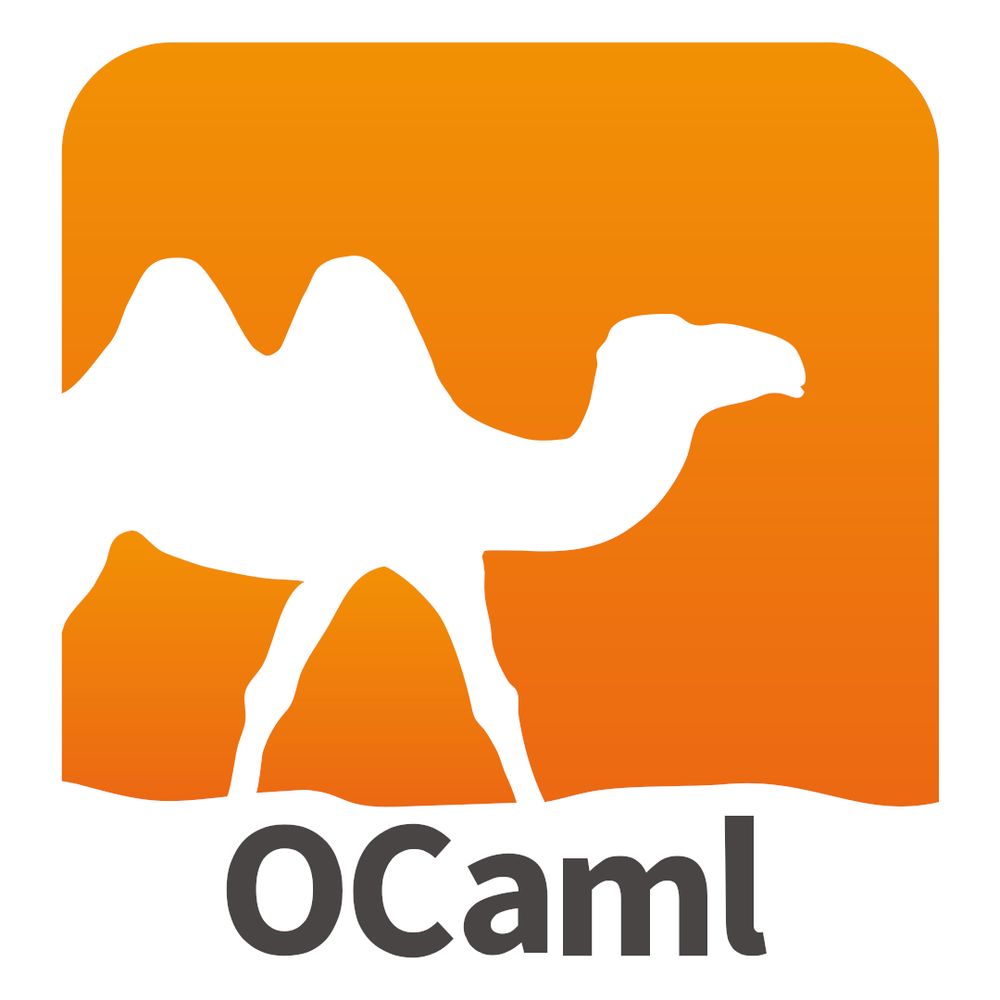
#OCaml #OCamlPlanet
01.08.2025 14:38 — 👍 0 🔁 0 💬 0 📌 0@ocaml.org.bsky.social
https://ocaml.org
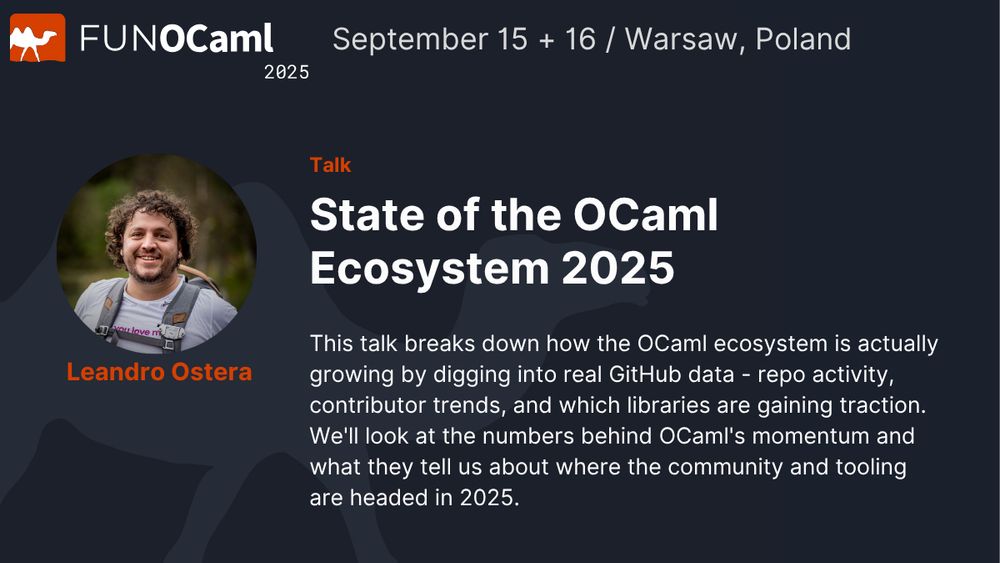
Conference slide for FUNOCaml 2025 event in Warsaw, Poland on September 15-16. Features a circular photo of Leandro Ostera, a man with curly hair wearing a gray t-shirt, smiling outdoors. The slide announces his talk titled 'State of the OCaml Ecosystem 2025' with description: 'This talk breaks down how the OCaml ecosystem is actually growing by digging into real GitHub data - repo activity, contributor trends, and which libraries are gaining traction. We'll look at the numbers behind OCaml's momentum and what they tell us about where the community and tooling are headed in 2025.'
🐫 Don't miss Leandro Ostera at FUN OCaml 2025 in Warsaw, Sept 15-16!
"State of the OCaml Ecosystem 2025" digs into real GitHub data - repo activity, contributor trends, and which libraries are gaining traction.
See the numbers behind OCaml's momentum and where it's headed.
we still have free tickets for on-site FUN OCaml 2025 in Warsaw, btw
hurry up and plan your travels!
fun-ocaml.com
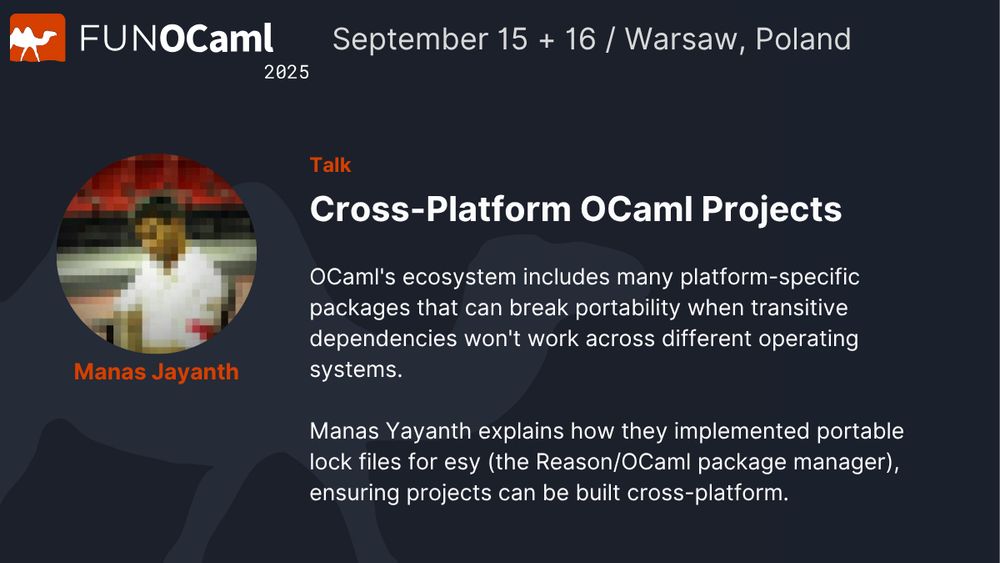
Conference slide for FUNOCaml 2025, September 15-16 in Warsaw, Poland. Shows a talk titled 'Cross-Platform OCaml Projects' by Manas Jayanth, with a pixelated profile photo. The description reads: 'OCaml's ecosystem includes many platform-specific packages that can break portability when transitive dependencies won't work across different operating systems. Manas Yayanth explains how they implemented portable lock files for esy (the Reason/OCaml package manager), ensuring projects can be built cross-platform
🚀 Manas Jayanth is presenting "Cross-Platform OCaml Projects" at FUNOCaml 2025 in Warsaw!
They'll share how they implemented portable lock files for esy (Reason/OCaml package manager) to achieve reproducible builds across different operating systems.
📅 Sept 15-16, Warsaw
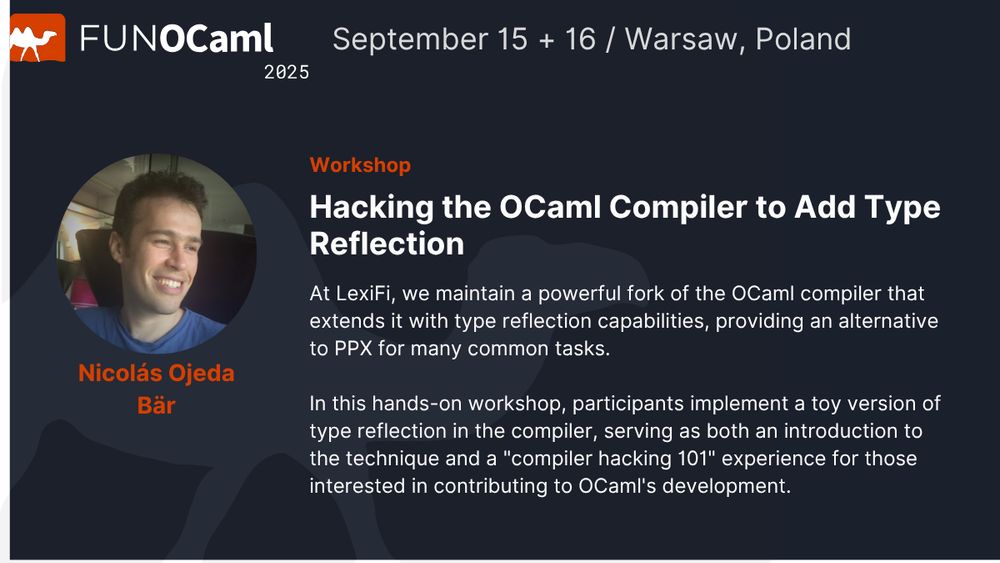
Conference slide for FUNOCaml 2025 workshop in Warsaw, Poland on September 15-16. Features a circular photo of presenter Nicolás Ojeda Bär, a smiling man with brown hair wearing a blue shirt. The workshop is titled "Hacking the OCaml Compiler to Add Type Reflection" and describes how LexiFi maintains a powerful fork of the OCaml compiler with type reflection capabilities as an alternative to PPX. The workshop offers hands-on experience implementing a toy version of type reflection in the compiler, serving as both an introduction to the technique and a "compiler hacking 101" experience for those interested in contributing to OCaml's development
🚀 Ready to hack the OCaml compiler?
Join Nicolás Ojeda Bär from LexiFi at FUNOCaml 2025 for "Hacking the OCaml Compiler to Add Type Reflection" - a hands-on workshop where you'll implement type reflection as an alternative to PPX.
📅 Sept 15-16, Warsaw
🔧 Compiler hacking 101
#OCaml #FUNOCaml2025
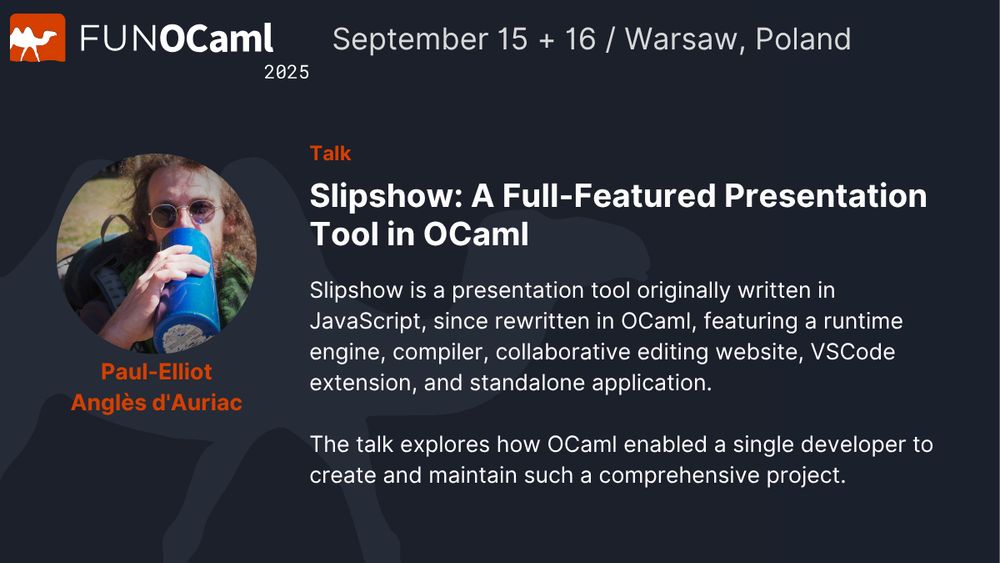
Conference presentation slide for FUNOCaml 2025 event in Warsaw, Poland on September 15-16. Features a circular photo of Paul-Elliot Angles d'Auriac, a person with shoulder-length wavy hair wearing round glasses and drinking from a blue cup. The slide announces a talk titled "Slipshow: A Full-Featured Presentation Tool in OCaml" and describes how Slipshow is a presentation tool originally written in JavaScript but rewritten in OCaml, featuring a runtime engine, compiler, collaborative editing website, VSCode extension, and standalone application. The talk explores how OCaml enabled a single developer to create and maintain such a comprehensive project.
Paul-Elliot Angles d'Auriac:
Slipshow: A Full-Featured Presentation Tool in OCaml
FUN OCaml 2025 | Warsaw | Sept 15-16
How one developer rewrote a JavaScript presentation tool in OCaml, creating a platform with runtime engine, collaborative editing, VSCode extension & app.
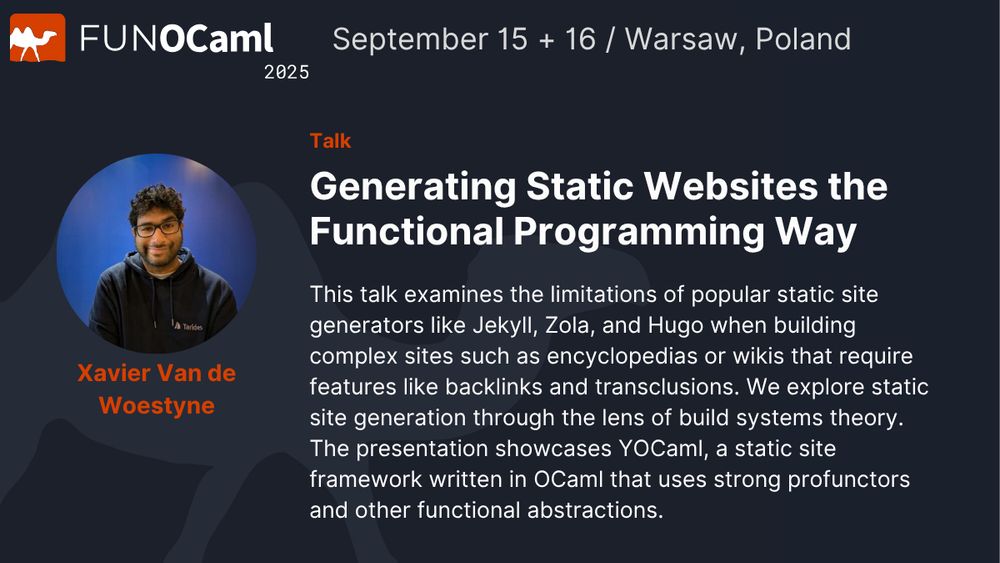
Conference talk slide for FUNOCaml 2025 in Warsaw, Poland (September 15-16). Features a circular photo of speaker Xavier Van de Woestyne wearing glasses and a dark hoodie. The talk title is "Generating Static Websites the Functional Programming Way" and describes how the presentation examines limitations of popular static site generators like Jekyll, Zola, and Hugo for complex sites, exploring static site generation through build systems theory and showcasing YOCaml, a static site framework written in OCaml using functional programming abstractions.
Xavier Van de Woestyne
"Generating Static Websites the Functional Programming Way"
at #FUNOCaml 2025!
Exploring limitations of Jekyll/Hugo/Zola for complex sites + introducing YOCaml — a static site framework in OCaml using functional abstractions
📅 Sept 15-16 | Warsaw

Conference slide for FUNOCaml 2025 in Warsaw, Poland on September 15-16. Features a circular photo of speaker Dmitriy Kovalenko, a man with glasses and light hair wearing a dark jacket over a white shirt, photographed outdoors. The slide announces his talk titled 'OxCaml From a System Engineer's Point of View' with description: 'Dmitriy Kovalenko, a systems programmer experienced with Rust, C, and Zig, explores 0xCaml as a potential addition to his toolkit. He investigates how 0xCaml compares to native OCaml and other systems languages, then tests it by building codiff, a high-performance image comparison library with 0xCaml, sharing his findings and lessons learned from the experience.'
FUNOCaml 2025 Talk
"OxCaml From a System Engineer's Point of View"
📅 Sept 15-16, Warsaw
Dmitriy Kovalenko (Rust/C/Zig dev) evaluates 0xCaml for systems programming through building odiff, a high-performance image comparison library.
Comparative analysis + practical insights

register for free to join us in Warsaw at fun-ocaml.com
or watch the YouTube livestream on September 15 + 16!

Conference poster for FUNOCaml 2025 workshop in Warsaw, Poland on September 15-16. Features a circular photo of Lukasz Stafiniak, a bearded man with shoulder-length hair. The workshop is titled 'Train a Reinforcement Learning Agent for the Game Sokoban in Raven/OCANNL' and describes covering reinforcement learning basics, building game environments, neural network models (CNN or transformer), training infrastructure, and exploring GRPO (Group Relative Policy Optimization) algorithms and connections to language model training.
Exciting news! Lukasz Stafiniak will lead a hands-on RL workshop at #FUNOCaml2025 in Warsaw (Sept 15-16)! 🐫
Learn to train a Sokoban game agent using Raven/OCANNL - covering neural networks, GRPO algorithms, and connections to LLM training 🤖🎮

Full Story: ocaml.org/success-stor...
14.07.2025 08:04 — 👍 2 🔁 0 💬 0 📌 0
New Success Story: Secure Internet Services with OCaml and MirageOS 🔒
Robur, a worker-owned collective, builds secure, high-performance, and resource-efficient software solutions!
OCaml's static typing eliminates runtime errors with predictable performance - perfect for system-level programming.

Full Story: ocaml.org/success-stories/secure-and-verifiable-online-voting-platform
11.07.2025 12:42 — 👍 3 🔁 0 💬 0 📌 0